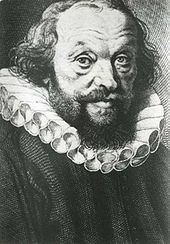
Johann Jakob Bodmer was a Swiss author, academic, critic and poet.
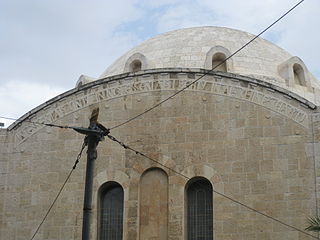
In necessariis unitas, in dubiis libertas, in omnibus caritas is a Latin phrase.
Crypto-Calvinism is a pejorative term describing a segment of those members of the Lutheran Church in Germany who were accused of secretly subscribing to Calvinist doctrine of the Eucharist in the decades immediately after the death of Martin Luther in 1546. It denotes what was seen as a hidden Calvinist belief, i.e., the doctrines of John Calvin, by members of the Lutheran Church. The term crypto-Calvinist in Lutheranism was preceded by terms Zwinglian and Sacramentarian. Also, Jansenism has been accused of crypto-Calvinism by Roman Catholics.

The Book of Concord (1580) or Concordia is the historic doctrinal standard of the Lutheran Church, consisting of ten credal documents recognized as authoritative in Lutheranism since the 16th century. They are also known as the symbolical books of the Evangelical Lutheran Church.
Ad fontes is a Latin expression which means "[back] to the sources". The phrase epitomizes the renewed study of Greek and Latin classics in Renaissance humanism, subsequently extended to Biblical texts. The idea in both cases was that sound knowledge depends on the earliest and most fundamental sources.

Marco Antonio de Dominis was a Dalmatian ecclesiastic, archbishop of Split and Primate of Dalmatia and all Croatia, adjudged heretic of the Catholic faith, polymath and man of science.
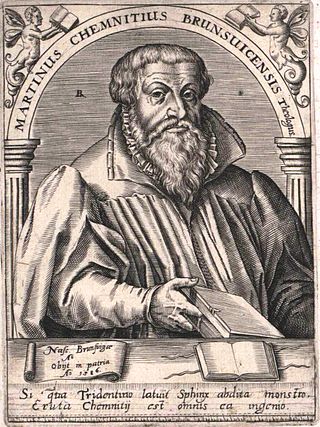
Martin Chemnitz was an eminent second-generation German, Evangelical Lutheran, Christian theologian, and a Protestant reformer, churchman, and confessor. In the Evangelical Lutheran tradition he is known as Alter Martinus, the "Second Martin": Si Martinus non fuisset, Martinus vix stetisset goes a common saying concerning him. He is listed and remembered in the Calendar of Saints and Commemorations in the Liturgical Church Year as a pastor and confessor by both the Evangelical Lutheran Church in America and Lutheran Church–Missouri Synod.
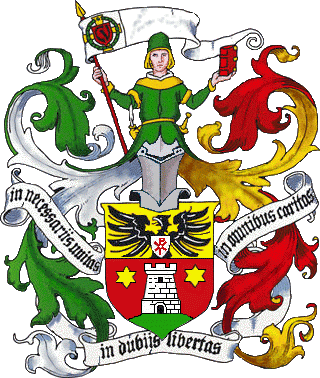
The Union of Catholic German Student Fraternities is a German umbrella organization of Catholic male student fraternities (Studentenverbindung).
The Apology of the Augsburg Confession was written by Philipp Melanchthon during and after the 1530 Diet of Augsburg as a response to the Pontifical Confutation of the Augsburg Confession, Charles V's commissioned official Roman Catholic response to the Lutheran Augsburg Confession of 25 June 1530. It was intended to be a defense of the Augsburg Confession and a refutation of the Confutation. It was signed as a confession of faith by leading Lutheran magnates and clergy at the meeting of the Smalkaldic League in February, 1537, and subsequently included in the German [1580] and Latin [1584] Book of Concord. As the longest document in the Book of Concord it offers the most detailed Lutheran response to the Roman Catholicism of that day as well as an extensive Lutheran exposition of the doctrine of Justification.

Jakob Andreae was a significant German Lutheran theologian and Protestant Reformer involved in the drafting of major documents.

Wilhelm, Duke of Saxe-Weimar, was a duke of Saxe-Weimar.
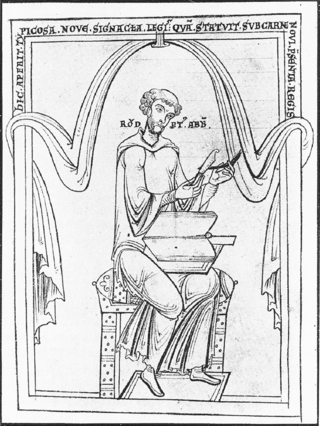
Rupert of Deutz was an influential Benedictine theologian, exegete and writer on liturgical and musical topics.
Hugo Karl Erich Rahner was a German Jesuit theologian and ecclesiastical historian. He was Dean and president of the University of Innsbruck and the elder brother of the famous theologian Karl Rahner.

Johann Deutschmann was a German Lutheran theologian.

Ludwig Camerarius was a German statesman, lawyer, minister and head of Frederick V's government-in-exile in The Hague. He also served Swedish interests later in his life. He was the son of the scholar Joachim Camerarius the Younger and grandson of Joachim Camerarius the Elder.
Christoph von Stadion (1478–1543) was Prince-Bishop of Augsburg from 1517 to 1543.
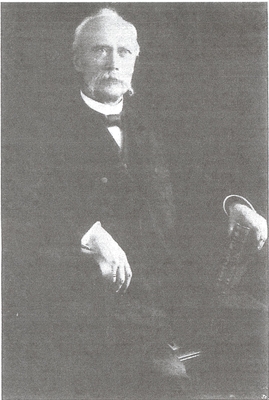
Gotthold Julius Rudolph Sohm was a German jurist and Church historian as well as a theologian. He published works concerning Roman and German law, Canon law and Church History.
The Catholic Integrated Community (CIC) was an apostolic community within the Roman Catholic Church according to Decree Apostolicam actuositatem No. 18/19 of the Second Vatican Council. It was recognized by the church in several dioceses in Germany, Austria, Italy and Tanzania,. After an investigation of the community by the Archdiocese of Munich and Freising, Munich Archbishop Cardinal Reinhard Marx dissolved it under canon law in November 2020. In the meantime, most of the German dioceses followed suit and also dissolved the integrated communities.

Lucas Bacmeister was a Lutheran theologian and church music composer.

Jacob Stolterfoht was a German Lutheran theologian and leading pastor in Lübeck during and directly following the Thirty Years' War.
